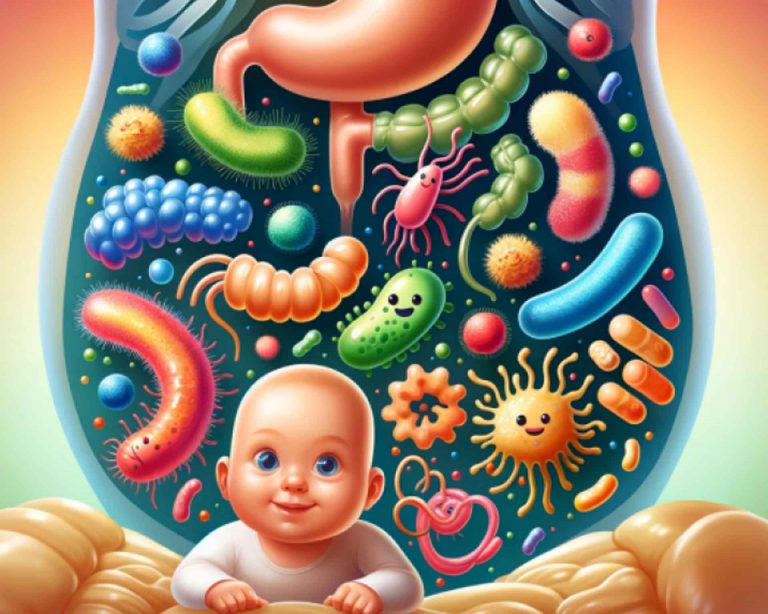Let’s journey together through the tiny universe within us – the microbiome. This bustling metropolis of microbes is crucial for human health, with the infant gut microbiome deserving special attention.
Infant Gut Microbiome Development:
The unfolding story of the infant gut microbiome is a fascinating one, commencing right at birth. A baby’s first “hello” to microbes happens during this time, but the nature of this greeting differs based on the type of delivery. Studies reveal a interesting detail – infants born naturally have gut microbiota that echo their mothers’ vaginal microbiota. In contrast, their peers who entered the world via Cesarean section reflect skin microbiota (1). Isn’t it amazing how the very first moments of our life can shape our microbial companions?
As our baby grows, the gut microbiota receives new guests, the nature of which depends on their diet. Research has found that the gut microbiota of breastfed infants is dominated by Bifidobacteria, the friendly microbes that thrive on human milk oligosaccharides (2). However, the gut community of formula-fed infants hosts a more diverse crowd, including Bacteroides, bacteria known to break down plant polysaccharides.
The Power-Packed Gut: Its Implications on Health
The composition of the infant gut microbiome has long-lasting impacts on their health. A healthy gut can be your child’s best friend, bolstering their immune system (3) and even steering them clear of conditions like type 1 diabetes (4).
But what if your baby’s gut health needs a boost? Enter the superheroes – probiotics and prebiotics. These gut-friendly agents can do wonders for your child’s health, from reducing the incidence of sepsis (5) to improving stool consistency and enhancing the beneficial Bifidobacteria and Lactobacilli (6).
Is Probiotic a Magic Bullet for Your Baby?
As we sail further into the sea of gut microbiota research, one question that puzzles many parents is – does my baby need a probiotic supplement?
Well, the answer is not a simple yes or no. The decision should hinge on several factors such as the baby’s health, diet, and mode of delivery. But remember, it’s always wise to seek the advice of a healthcare professional before adding any new supplement to your baby’s diet.
Here are some signs that your baby may benefit from probiotics:
- Digestive issues: Babies grappling with colic, acid reflux, constipation, or diarrhea could find relief through probiotics. In fact, a systematic review found that a strain of probiotic, Lactobacillus reuteri, reduced crying and fussing time in breastfed infants with colic (7).
- Antibiotic use: Antibiotics, while fighting harmful bacteria, could accidentally eliminate the beneficial ones, throwing off the balance of your baby’s gut microbiota. Probiotics can help restore this balance, like friendly soldiers filling in the ranks
- Cesarean birth and formula feeding: As we discussed earlier, these babies have different gut microbiota compared to their vaginally born, breastfed peers. Probiotics may be the key to enhancing their microbiome diversity.
- Preterm birth: Preterm infants are at a higher risk of severe intestinal disease called necrotizing enterocolitis (NEC). The good news is, probiotics could decrease the incidence and severity of NEC in these little ones (8).
Choosing the right probiotic can feel like navigating a maze, but here are some pointers to consider: - Strain: Different bacterial strains have different effects. Lactobacillus reuteri and Bifidobacterium lactis are commonly used in infants.
- Dose: Look for a product that provides a sufficient number of live bacteria, typically in the billions.
- Reputation: Go for a brand known for its research-backed quality control.
Keep in mind, every baby is unique and there’s no one-size-fits-all solution. Moreover, the use of probiotics in infants is still a growing area of research, and not all infants will necessarily need them.
I hope you enjoyed this journey into the tiny universe of the infant gut microbiome. As the field of microbiome research expands, we’re confident that we’ll discover even more ways to promote the health and happiness of our little ones.
References:
- Shao Y, Forster SC, Tsaliki E, et al. (2020). Stunted microbiota and opportunistic pathogen colonization in caesarean-section birth. Nature. https://doi.org/10.1038/s41586-020-2192-1
- Bäckhed F, Roswall J, Peng Y, et al. (2016). Dynamics and Stabilization of the Human Gut Microbiome during the First Year of Life. Cell Host & Microbe. https://doi.org/10.1016/j.chom.2015.04.004
- Cahenzli J, Köller Y, Wyss M, Geuking MB, McCoy KD. (2021). Intestinal microbial diversity during early-life colonization shapes long-term IgE levels. Cell Host & Microbe. https://doi.org/10.1016/j.chom.2013.10.004
- Vatanen T, Franzosa EA, Schwager R, et al. (2019). The human gut microbiome in early-onset type 1 diabetes from the TEDDY study. Nature. https://doi.org/10.1038/s41586-018-0620-2
- Panigrahi P, Parida S, Nanda NC, et al. (2020). A randomized synbiotic trial to prevent sepsis among infants in rural India. Nature. https://doi.org/10.1038/s41586-020-2192-1
- Vandenplas Y, Zakharova I, Dmitrieva Y. (2021). Oligosaccharides in infant formula: more evidence to validate the role of prebiotics. British Journal of Nutrition. https://doi.org/10.1017/S0007114515001452
- Sung V, D’Amico F, Cabana MD, et al. (2018). Lactobacillus reuteri to Treat Infant Colic: A Meta analysis. Pediatrics. https://doi.org/10.1542/peds.2017-1811
- Athalye-Jape G, Rao S, Patole S. (2020). Effects of probiotics on experimental necrotizing enterocolitis: a systematic review and meta-analysis. NeoReviews. https://doi.org/10.1542/neo.21-2-e126







